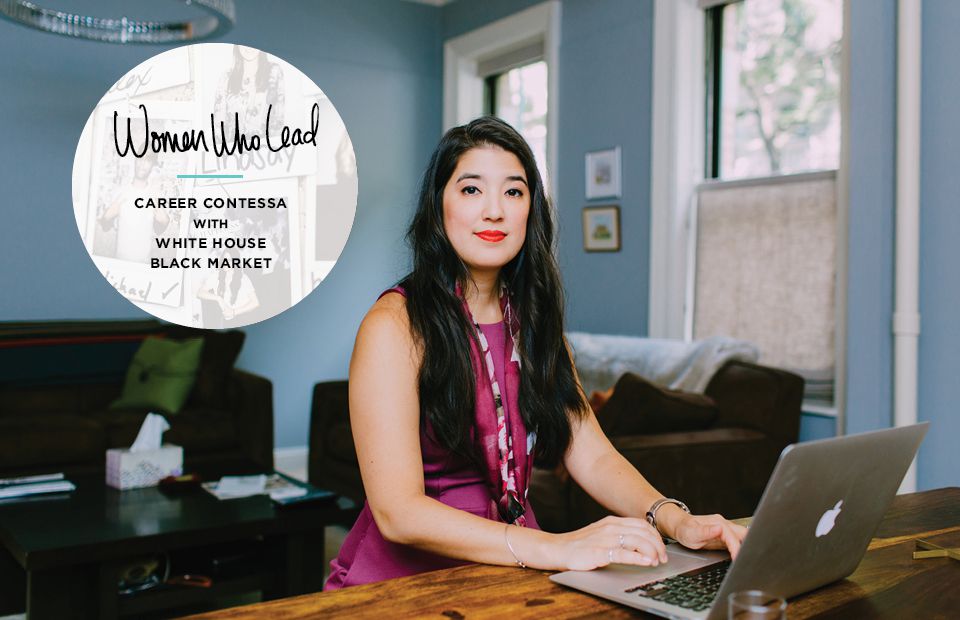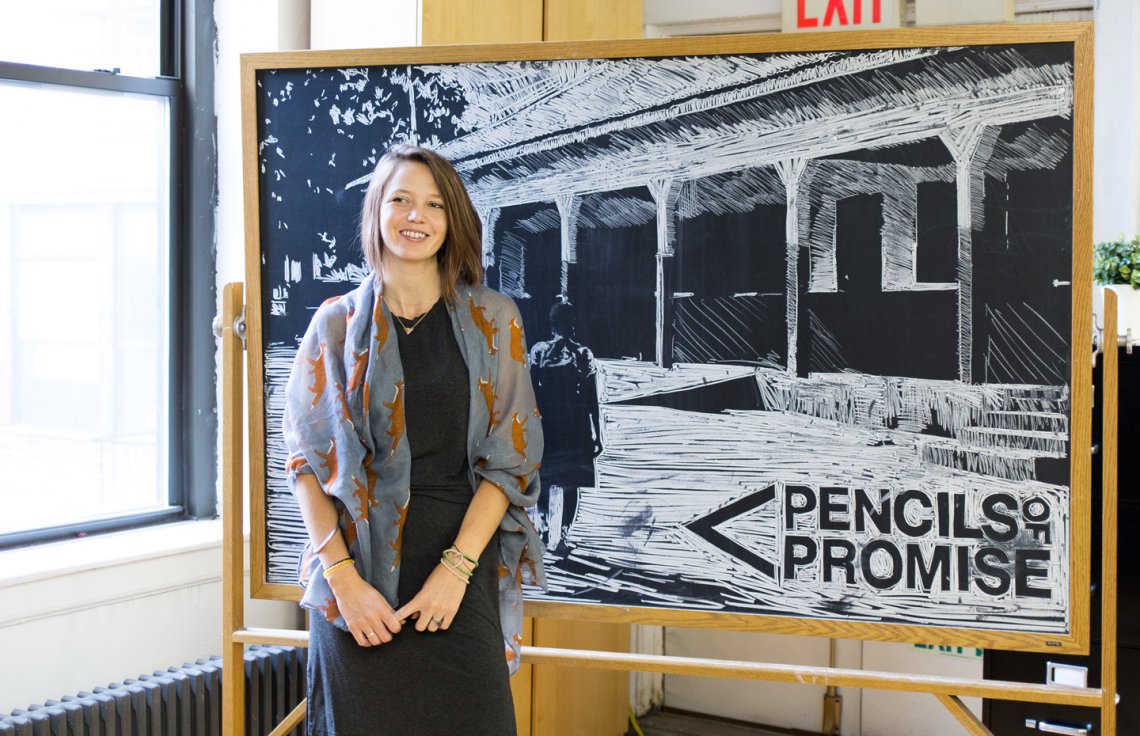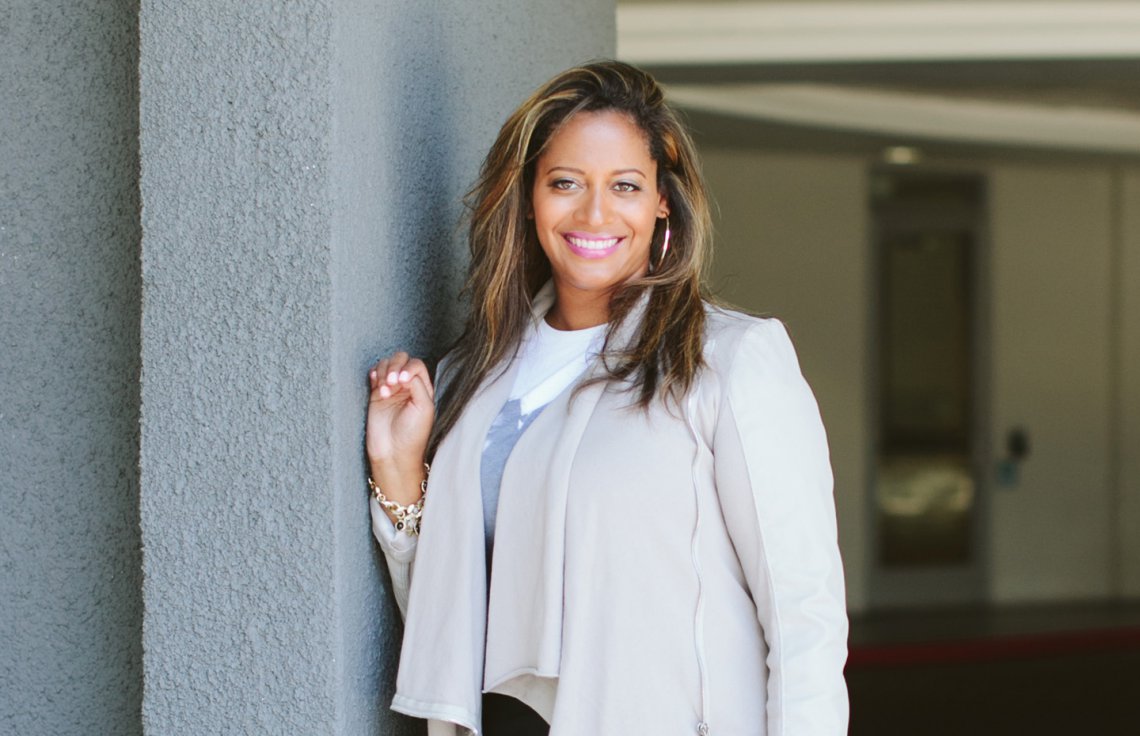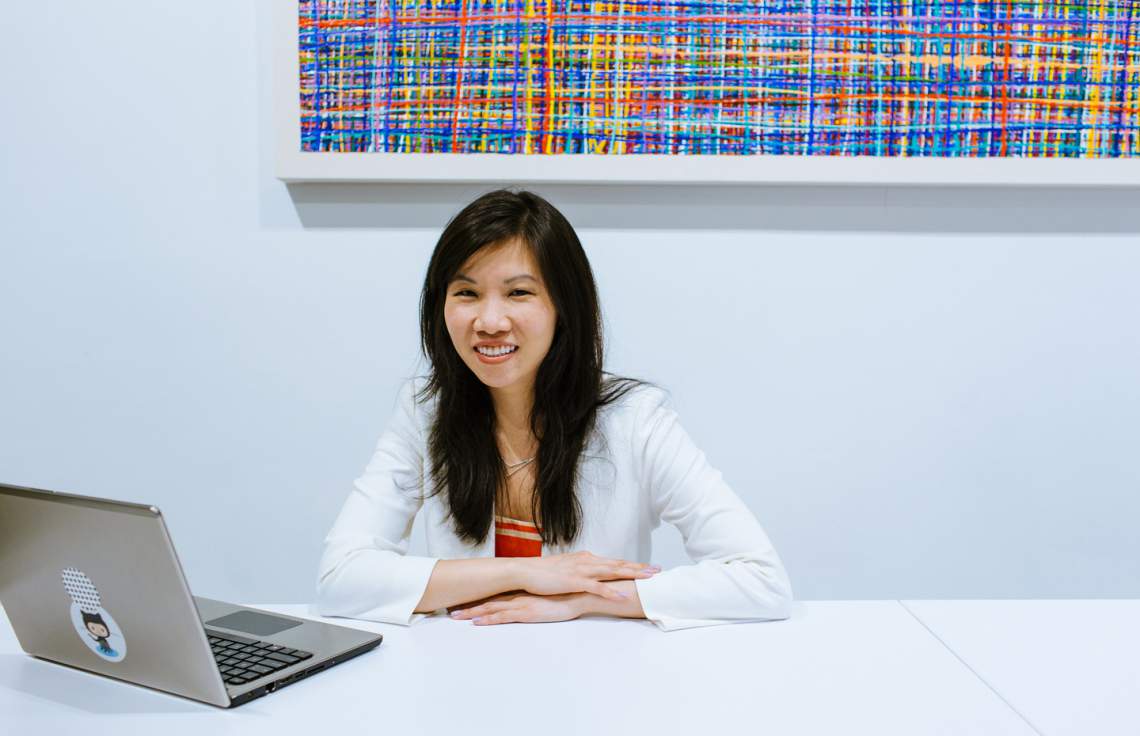Jennie Kim has experienced things most of us have only seen on the news. It all started with her first job with the State Department, where Jennie learned the true value of an education thanks to her work with women and children in Afghanistan. She was deeply moved by the willful Afghan women who would risk their lives under Taliban rule in order to send their daughters to school. This showed Jennie just how powerful education was and how it could transform people and the world. Today, Jennie is a program manager at Udacity, a for-profit educational organization, where she works to bring free online education to the masses.
Though she’s worked hard to earn a Bachelor’s degree from Stanford and a Master’s degree from George Washington University, Jennie is a firm believer that education never ends. This shows through her work with Udacity, where she aims to make life-long learning a goal anyone can achieve.
Living through so many different experiences and accomplishing so much at her young age has given Jennie a truly unique perspective. She encourages women to clarify exactly what their passions are and to just go after them—although she adds that faltering a bit along the way is a natural part of the journey. Following her heart and knowing her passions led Jennie to a career where she looks forward to waking up and learning something new each and every day.
EDITOR'S NOTE: Jennie is now a Career Contessa Mentor! Click here to book personalized career advice with her.
Her Starting Point
Many people find the transition between college and “real life” a bit daunting. Can you tell us about your journey between the two? What was your first job post-college?
My first job after grad school was at the State Department. I landed the job as part of a career entry program called the Presidential Management Fellowship. I served as a Foreign Affairs Officer, focusing on Afghanistan programs. Eventually, I managed all of the State Department’s justice programs for women and girls in Afghanistan, and made frequent trips to the region.
I was at the State Department for almost 5 years. In that time, I worked all around the world, including at outposts in Kabul, Jerusalem and Kosovo. By the time I left, I was a different person. I knew what it felt like when a car bomb detonated 150 yards away, or when a rocket-propelled grenade hit your compound. I understood what it was like to feel terror, and through that, developed a much richer sense of compassion than ever before.
Can you tell us about the most beneficial class you ever took? Are there any you wish you had taken? Any you wish you hadn’t?
I’ve been lucky because I’ve had many great teachers, from elementary school to high school, and in college. Part of me wishes that I’d taken computer science coursework in college. Picking up programming skills earlier would have made my transition to a career in tech easier.
I don’t have regrets because technology now exists to make life-long learning a real option. Learning is no longer restricted to four walls or four years. Companies like Udacity make it possible to learn new skills anytime and anywhere.
I think it’s a huge mistake to assume that learning ends after you graduate from college, that what you decide to major in when you’re 19 or 20 determines the rest of your life. Do you remember what you were like at 19? Should that version of yourself determine your career for life? That’s insane!
What drew you to Udacity and online education? How did your past work with the State Department influence your decision to work with Udacity?
Advancing education is a personal mission for me because of my upbringing. My parents emigrated to America from Korea, and they gave up a lot to ensure that my sister and I each got a world-class education. We were taught very early on that if we worked hard enough, we could achieve anything.
When I was at the State Department, I worked with women who risked their lives under Taliban rule to teach their daughters in underground schools. I saw how education transforms people. Education speaks truth to the lie that the choices you make don’t matter. You learn that you have control over your own life, over your own thoughts. I can’t express in words how powerful that is.
What do you love most about working at Udacity? What is the company culture like?
One of my coworkers said it best: “I get paid to learn.” What could be better?
There are lots of things that I love about Udacity. I love that so many strong women work here. Maybe it’s because women gravitate towards education. Whatever the reason, it makes our company feel qualitatively different from a lot of other tech start-ups. When I came to Udacity, it was like a breath of fresh air.
Another thing that sets Udacity apart from a lot of tech start-ups is how much we focus on the creative process. We make all of our content in-house and have 5 different recording studios in our office. We’re filming and producing new material all the time. It sometimes feels like we’re on a really nerdy Hollywood movie set.
The culture is very casual compared to what I experienced in government. There are, literally, no walls. When I need help, I’m not afraid to ask anyone, and I mean anyone for support—from an employee to the CEO. There are no barriers to communication.
Her Big Break
Could you give us a brief overview of your role as a program manager?
I’m in charge of planning and executing clear, transparent processes to deliver amazing courses on-time.
The most important part of my job is helping my team succeed. We work with industry partners like Google and Facebook to teach classes reflecting what they actually look for in employees. Our classes are backed by industry, which is something that makes Udacity unique. I manage a team of Course Developers who work directly with industry leaders to make best-in-class educational content.
I recently wrapped up a year-long assignment to launch the Georgia Tech online masters degree program, which featured a Top-10 university offering a full master’s degree in computer science for under $7,000. It had never been done before. Running the pilot was an incredible team effort. We definitely had our stressful moments, but we pulled together and made the launch a success.
If we had the chance to peek at your schedule, what would an average day look like?
5:30 a.m.: Wake up, walk the dog and get ready for work.
6:30 a.m.: Commute to Udacity in Mountain View, which is about 35 miles away from my house.
I listen to a lot of audiobooks. Right now, I’m listening to “Brain Rules” by John Medina. Past favorites include “The Power of Habit” by Charles Duhigg, “College Unbound” by Jeffrey Selingo and “Bossypants” by my personal idol, Tina Fey.
7:15 a.m.: “Me Time.”
This is my favorite time of day because the office is silent. I like to spend an hour first thing in the morning working on something I care about. It could be taking a new course, reading student feedback or just writing a bunch of stuff. I call this “Me Time.”
8:15 a.m.: Go through my daily task list on Asana, a productivity tool we all use at Udacity.
Right now, I’m managing two courses that are in active production, so it’s a lot of running around between sets, reviewing scripts, digging up props and brainstorming.
9:30 a.m.: The office starts waking up. Now my office workday really starts.
12:00 p.m.: Lunch!
Lunch is catered daily, and we all eat together on picnic-style cafeteria tables. I’ve had lots of entertaining, enlightening and hilarious lunch conversations with coworkers.
12:30 p.m.: Back to work!
4:00 p.m.: Commute home. Listen to more audio books.
I like to get home in time to have dinner with my fiance and enjoy the evening. I usually do a little work from home, and get my email inbox to zero before I go to bed (at an embarrassingly early hour).
What is the most challenging part of your job? How do you keep yourself from getting burnt out?
The most challenging part of the job is motivating people who do not work for you, especially if they have different motives and interests than you do.
When I start feeling discouraged, I focus on why we’re doing this, and how we’re impacting our students. Our students inspire me everyday.
I also rely on humor a lot to keep me from getting burnt out. There’s this great Friar’s Club saying, “If nothing’s funny, nothing’s serious.” I basically live by that.
What tools do you use to stay current in your ever-changing industry?
Staying current for me is really about knowing what our students are experiencing, following their comments on the course forums, Facebook and our blog. Staying current also means dogfooding the product, taking our own courses and not losing touch with the student experience.
When it comes to the tech industry, the real challenge isn’t staying current, it’s staying grounded. Silicon Valley is not the real world. Mind-boggling wealth, Teslas in the parking lot, endless perks and swag—this is not real life for 99.9 percent of humankind. Even the weather doesn’t feel real! It’s 70 degrees and sunny everyday. It’s so easy to lose touch with reality here.
Staying involved with causes I care about helps keep me humble. I think of the women I worked with in Afghanistan as my sisters. It’s easy to do great things when you have access to all the resources of Silicon Valley. It’s a lot harder to do what they’re doing.
Her Perspective
What skills are essential to working as a program manager? Do you think having an industry niche is important?
Clarity is so important in this business. You have to be able to state your ideas and objectives in a concise, action-oriented way. You also need clarity in your thinking—you can’t let emotions drive your decisions.
Interpersonal skills are critical. Understanding where people are coming from, having patience and empathy and being able to see things from another perspective are all essential skills.
Finally, problem solving is a must. To me, problems around education are “lovable problems”—we need creativity and toughness to solve them.
Translating passion into a career is tough. What advice would you give to women trying to figure this out?
First, you need to define and communicate your passion clearly, and identify the career paths that you want to explore.
When you have clarity around your goals, reach out to people for help. Tap into your LinkedIn, Facebook and alumni networks. Whenever you ask for help, keep your request brief, courteous and clear, and always follow-up with a thank you.
Do whatever you can to keep heart. Transitioning to a new career that fulfills your passions is not easy, and there will be times when you feel hopeless. Be ready for that.
What do you think online education offers in comparison to physical educational institutions? What are some of the advantages of educational courses like those offered by Udacity? Do you think you would have benefited from such offerings when you were in the midst of your education?
We have five overarching values at Udacity for our course content. We want our classes to be Demonstrable, Rigorous, Personal, Joyful and Social.
We want to make learning as practical as possible, which means challenging the traditional lecture format. Having a person talk at you for an hour is not terribly engaging for the learner. We want students to be practicing all the time because actually trying and doing things is how you learn. We want students to be unafraid of getting things wrong.
We also make it possible for students to have a mentor, or Udacity Coach, to review their work, give them feedback and help keep them accountable for their success.
I definitely would have benefitted from something like Udacity in college. I think a lot of my classmates would!
And finally, what do you wake up looking forward to? What’s next for your career?
I wake up looking forward to learning something new everyday.
I’m working on building my programming skills, and am interested in moving towards more technical aspects of management, possibly managing product execution and doing more sophisticated data analysis.
Luckily, I’m at the best possible place to build myself up for whatever comes next. I’m surrounded by brilliant people who love teaching! How cool is that?
EDITOR'S NOTE: Jennie is now a Career Contessa Mentor! Click here to book personalized career advice with her.
You May Also Like

Government + Public Policy
How to Become a Foreign Service Officer
Ever wondered what it would be like to work in Foreign Affairs? Gloria Chou knows, and she's spilling.

Government + Public Policy
Noor Elkhaldi on Taking a Break From School to Work as an SVU Counselor
"You cannot care for others if you do not care for yourself."

Consumer Services, Education, Finance
Women Who Lead: Alexandra Dickinson, Founder and CEO of Ask For It
On taking risks and asking for more—always.

Nonprofit, Social Responsibility
Leslie Engle Young on What a Director of Impact Actually Does
This philanthropic globetrotter found her dream career working at Pencils of Promise.

Entertainment, Government + Public Policy
Meet the Woman Behind Your Favorite T.V.
See how Candace's legal background has helped her climb the ladder to a director role at Sony Pictures.

Government + Public Policy
This Millennial Entrepreneur Talks Politics, Activism, and...How to Vote?
Election season's almost over, but Maria Yuan's company, IssueVoter, is just getting started.
Get the Best Career Advice Delivered To Your Inbox
Join our newsletter to stay in the loop.
